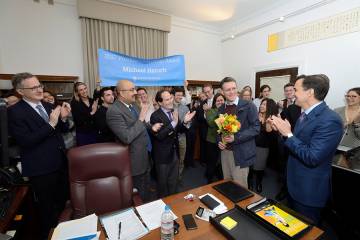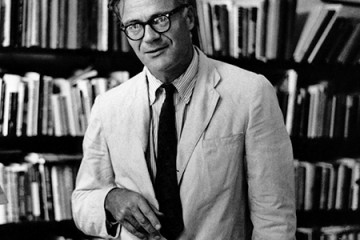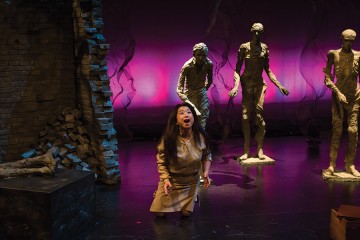Ever since writer and psychologist Kay Redfield Jamison and composer Michael Hersch met at a Johns Hopkins Brain Science Institute initiative event in 2010, they have been both friends and collaborators on a number of projects melding their mutual interests and expertise.
In 2015, Jamison—professor of psychiatry and co-director of the Johns Hopkins Mood Disorders Center—saw and heard faculty artist Ah Young Hong performing in Hersch's monodrama On the Threshold of Winter at the university's Peabody Institute. Threshold, a profoundly personal and unflinching exploration of terminal illness, mines the intense realities and psychological states of illness, which in some ways are similar to the mood disorders that Jamison studies and navigates herself as a person with manic-depressive bipolar disorder. Since that time, Jamison and Hersch have married Hong's powerful musicality and stage presence with the intense environments of Jamison's writing and an array of compositional voices from the past.
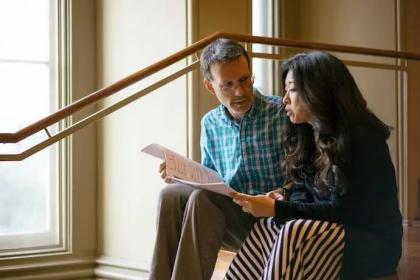
Image caption: Michael Hersch, left, and Ah Young Hong, right
Image credit: Peabody Magazine
For a concert titled Healing the Unquiet Mind—to be performed in the Miriam A. Friedberg Concert Hall on Peabody's Mount Vernon campus on Jan. 28 and at the Hopkins Bloomberg Center in Washington, D.C., on Feb. 3—Hersch, Hong, and Jamison have paired excerpts from Jamison's recent book, Fires in the Dark: Healing the Unquiet Mind, a cultural history of psychological and medical treatment and healing, with thematically related musical pieces that Hong performs with Peabody vocal coach and pianist Wei-Han Wu.
"My book is, more than anything, a reflection on healing the mind," Jamison writes in Fires in the Dark. "It is an archipelago of thoughts, experiences, and images. It is a book that looks back on the ancient, learns from the modern, and tries to discern the common threads and practices of extraordinary healing."
Says Hersch of the concert's program: "I've said before that I believe the writing of Kay Redfield Jamison has a uniquely dramatic architecture born not just of its specific content but the way she handles her materials, often resulting in work run through with what is at once beauty and striking urgency. This is the case when she is writing about her own life or documenting the lives of others.
"This ability to create beauty and urgency is also a hallmark of the performances of soprano Ah Young Hong," adds Hersch, who in 2017 received Johns Hopkins University's President's Frontier Award. "There are few musicians with her technical command and dramatic presence. She has an ability to both inhabit and communicate the states of being of others while remaining unquestionably the individual force at the center of her expression. The opportunity to hear the juxtaposition of these two compelling voices, voices able to capture the often terrifying complexities of our time, is a unique privilege."
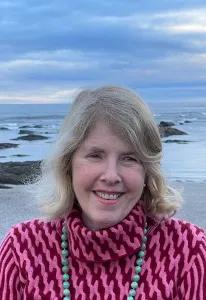
Image caption: Kay Redfield Jamison
Image credit: Peabody Magazine
Adds Jamison: "Music has always had an unmatched ability to portray and evoke moods, as well as to help in healing grief and suffering. Great healers from antiquity to our time have known this, just as they have known the healing power of music. The poetry and music that came from the trauma of the battlefields of the First World War found a parallel in the extraordinary advances in medicine and psychotherapy. This concert pays tribute to both those who suffered and those who healed the suffering. 'Fires in the dark you build,' wrote the poet Siegfried Sassoon about W. H. R. Rivers, his psychologist during the First World War: 'tall quivering flames / In the huge midnight forest of the unknown.'"
One portion of the concert's program pairs an excerpt from the "Big Sur" chapter of Fires—in which Jamison discusses her intellectual turn from experimental to clinical psychology during a 1970s period when her experience with psychotherapy and medication began giving her hope that she could get better and stay better—with Johann Sebastian Bach's Ich habe genug, one of the composer's most haunting sacred melodies.
Hong says an excerpt from this chapter, in which Jamison reflects on two contrasting experiences on Pfeiffer Beach, "had a very deep impact on me."
"I had to reconcile the glory of having reached for the stars with a more anchored, less splendid world. It was hard to do, leaving behind star fields at my feet and rings of Saturn through my hands, but the stars and planet had no place in life other than in imagination. Psychotherapy gave me the means to sort through and rearrange such intensely seductive memories. To heal is to understand what had been lost, whether it is innocence or sanity. To heal is to reshape the experience of loss into good. Intolerable memories should be made tolerable. Ecstatic ones, so different, yet capable of damage, should be kept on a tight rein. They should come to joy, not madness.
"I returned often to Big Sur after the night on Pfeiffer Beach. The stars no longer rained down on me nor swept across the cliffs and sea. I turned to life instead: differently beautiful, intense, and wonderfully strange."
"For me, Bach's Ich habe genug evokes an inner peace that transcends my own personal comprehension of this particular state of being," Hong says. "The inevitable death at the end of life is no longer feared with this peace. To be fulfilled, to have enough hope, ... ultimately to be at peace with oneself is truly beautiful. It is the kind of beauty that is not beyond the stars, but rather simply within our minds. Pain and healing—we know this. The concert is a reminder of how all of us are connected through this."
About the concert
Healing the Unquiet Mind takes place Jan. 28, at 4:30 p.m. in the Miriam A. Friedberg Concert Hall on Peabody's Mount Vernon campus, and on Feb. 3, at 4:30 p.m. at the new theater in the Johns Hopkins University Bloomberg Center at 555 Pennsylvania Ave., NW, in Washington, D.C. For more information, see Peabody's concert calendar.
*A version of this article originally appeared in* Peabody Magazine.
Posted in Arts+Culture
Tagged peabody, michael hersch, kay redfield jamison, hopkins bloomberg center





